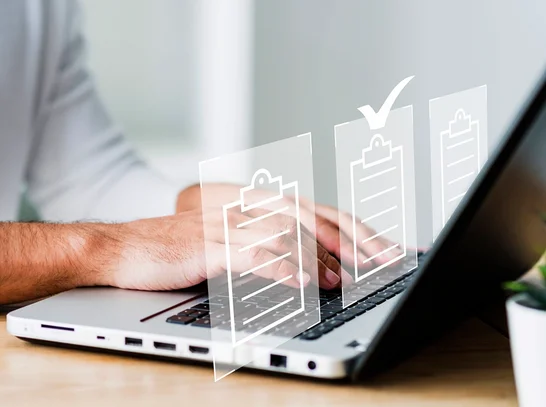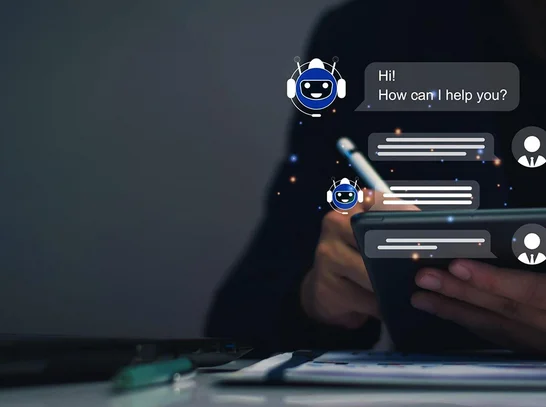Digitization of the invoice: challenges and opportunities
Electronic documents (e-receipts) are the backbone of modern business transactions. They include important documents such as invoices and credit notes in both directions (delivery and receipt). In addition, they offer functions for transmitting messages relating to the document status between access points.
These will now become mandatory in our neighbor Germany from the beginning of 2025 and will bring some changes with them. According to the new legislation, all B2B companies in Germany must be able to receive and process e-invoices in a structured format from this date.

E-Rechnungspflicht 2025: Das müssen Unternehmen wissen
However, this regulation not only affects German companies, but also has an indirect impact on many Austrian companies that maintain business relationships with German customers and partners. This is because there is a legal obligation to e-invoice as soon as there is a “permanent establishment” in Germany - for example a permanent establishment or a consignment warehouse. Beyond this, effects without a legal obligation can be assumed. Many German invoice recipients generally do not want multiple invoice receipt processes and will therefore “ask” all business partners to also send structured electronic invoices.
This means that even if the e-invoicing obligation currently only applies in Germany, companies in Austria must act now in order to be future-proof.
To find out more about the e-invoicing obligation and its effects, we conducted an interview with Klaus Schaffer, Senior Consultant EDI Service Partners, and Wolfgang Traunfellner, Director Sales & Marketing NAVAX. In the interview, they share their perspectives on the future of e-invoicing and how companies can prepare for the changes:
Interviewer: Mandatory e-invoicing from 2025 is a big topic in the business world. Klaus, can you give us a brief overview?
Klaus Schaffer: From January 1, 2025, all companies in Germany must be able to receive and process e-invoices. This means a move away from traditional paper and PDF invoices towards electronic formats such as XRechnung, EDI and ZUGFeRD, which can be machine-readable and processed automatically. The introduction of mandatory e-invoicing in the B2B sector is intended to represent a decisive step towards the digitalization and standardization of business processes. Germany is thus following the example of other EU member states that have already made e-invoices the standard for invoicing in business transactions.
Interviewer: That sounds like a big change for many companies. Wolfgang, how is NAVAX preparing for this change and how can your customers benefit from it?
Wolfgang Traunfellner: At NAVAX, we see the e-invoicing obligation as an opportunity for our customers to modernize their business processes and make them more efficient. Archiving documents electronically saves space and reduces the cost of physical storage. E-invoices can be imported and processed directly into the accounting systems. This reduces the manual work of the accountant. The faster processing of invoices also enables faster payment. This has a positive effect on cash flow. Automated processing minimizes the error rate compared to manual entry.
Interviewer: Klaus, how do you see the long-term benefits of e-billing for companies that switch over early?
Klaus Schaffer: The advantages are enormous. On the one hand, the switch to e-invoices leads to a reduction in manual intervention, which minimizes errors and increases efficiency. Secondly, the entire invoicing process is accelerated, which also improves liquidity planning. Companies that make the switch at an early stage can not only meet the legal requirements, but also make their processes more efficient and thus save costs in the long term. I think many companies do not yet realize that this obligation not only affects Germany, but will have to be implemented throughout the EU in the next few years due to an EU directive. Thanks to our locations in Germany and Austria, we can see how closely the markets are linked and that Austrian companies that work with German partners are also affected.
Interviewer: Wolfgang, how do you see the future of invoicing after 2025?
Wolfgang Traunfellner: After 2025, the digitization of invoicing will certainly continue to progress. E-invoicing is just the beginning. Although Austria does not currently have a mandatory e-invoicing obligation in the B2B sector, Austrian companies are also indirectly affected through their cooperation with German partners. And it is only a matter of time before similar regulations are introduced for the B2B sector here too. We are preparing our customers to proactively overcome future challenges instead of acting reactively. This is the added value that our joint expertise offers.
Interviewer: That sounds like an exciting future. Finally, what recommendations do you both have for companies preparing for mandatory e-invoicing?
Klaus Schaffer: My recommendation is to act now. The switch to e-billing is not only a regulatory obligation, but also an opportunity for modernization. Companies should review their systems and processes now and adapt them if necessary. I would therefore not limit the topic to e-invoicing alone, but also include other processes such as orders, order confirmations or delivery bills. It is important to have the right partners at your side who not only provide the technology, but also the necessary know-how for successful implementation and compliance.
Wolfgang Traunfellner: I can only agree with that. It's not just about meeting the legal requirements, but also about exploiting the full potential of digitalization. Incorrect invoices not only carry the risk of legal consequences, but also lead to more administrative work and delays in payment. Now is the time to analyze your processes and exchange ideas with experts. NAVAX and EDI Service Partners are here to support you on this journey and ensure you are prepared for anything you may encounter in the future.
Our conclusion
With the right preparation and the right partners, companies can not only meet the legal requirements, but also increase their efficiency and prepare for the future. Would you like to find out more about the e-invoicing obligation? Then we cordially invite you to our webinar in February. Learn first-hand from our experts how you can best prepare for the new legal requirements and what steps you should take. Take the opportunity and contact us!
E-bill provisions at a glance:
- From January 1, 2025, all B2B companies in Germany will be required to be able to receive and process e-invoices.
- From 2025, traditional PDF invoices and paper invoices will no longer meet the legal requirements for e-invoices.
- Electronic invoices must be created in a defined, digital format, such as the XRechnung invoice format, the EDI process and the ZUGFeRD invoice.
- According to the DIN EN 16931 standard, these e-invoices must contain more extensive details than traditional invoice formats.
- There are transitional periods for sending e-invoices (outgoing invoices) until December 31, 2027.
Legal background at European level:
- As part of the ViDA initiative (“VAT in the Digital Age”), the EU Commission intends to additionally introduce an electronic reporting system (VAT), which is to be filled from the e-invoice data.
- The aim of the measures is to simplify the VAT system and, above all, to curb fraud.
- All EU countries are therefore obliged to transpose the directive into national law.
Our partnership
The partnership between NAVAX and EDI Service Partners arose from the common desire to offer companies holistic and future-proof solutions for the digitalization of their business processes. NAVAX, as an experienced ERP partner, and EDI Service Partners, as a specialized provider of EDI services and Peppol connections, complement each other perfectly. Together, we offer our customers solutions that combine in-depth technical know-how and process understanding to prepare them optimally for future requirements - such as the e-invoicing obligation.
About EDI Service Partners
EDI Service Partners, consisting of Avenum and Avedium, offers a comprehensive EDI service that enables companies to efficiently connect their customers and suppliers in the right format. Customers can focus on their core business while EDI Service Partners optimizes digital communication thanks to its expertise in electronic data interchange.
This might also interest you
Invest time in building up your knowledge. This will put you in a stronger position for the future. Our webinars are also available on-demand - whatever suits you best.























































